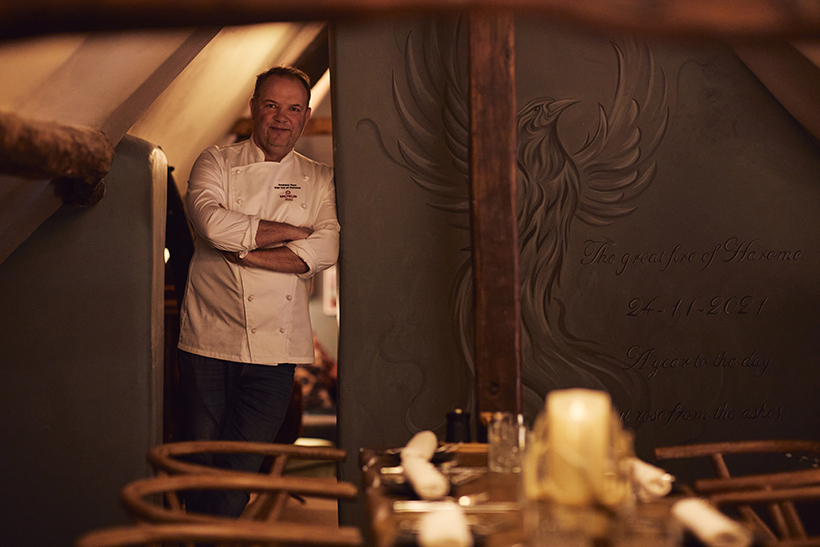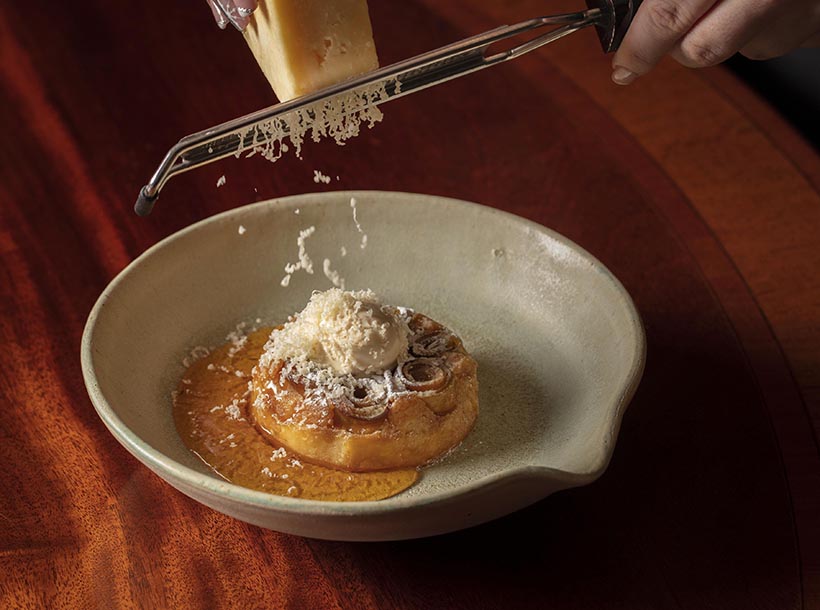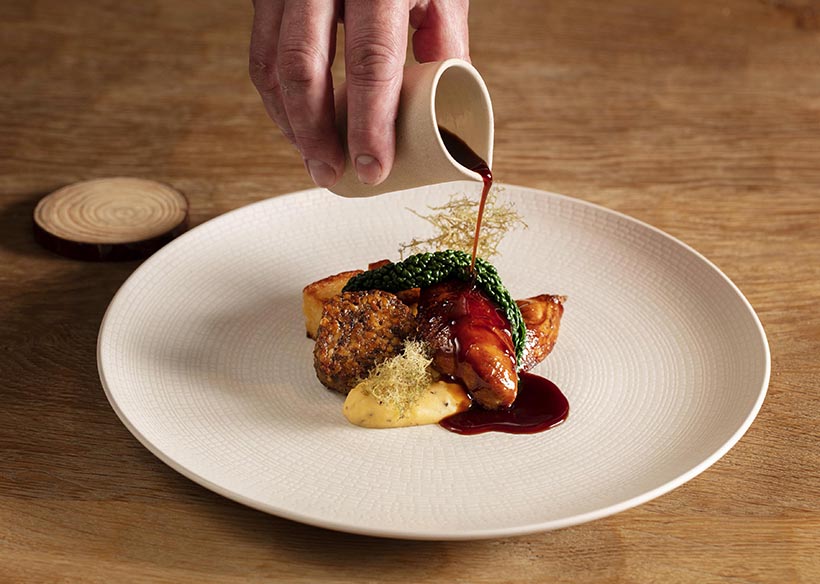When the Star at Harome suffered a devastating fire, locals gathered together to help rebuild. Chef-patron Andrew Pern speaks about finding the balance between replication and reinvention
One would expect the reopening of a much-cherished village pub to be packed to the newly restored rafters with grateful locals on its first night. What is less usual is for those villagers to have helped save the pub from disaster – and for the award-winning owner to be just as grateful to his customers as they are to him for having created arguably the best pub in the country on their doorstep. So when Andrew Pern invited the craftsmen who had been rebuilding the Star Inn at Harome for drinks, a year to the day after a fire tore through the thatched roof and gutted the interior, it's fair to say there was a lot to celebrate.
"All the craftsmen live within a 10-mile radius of the Star," Pern says. "We invited them with their partners so they could see what their other halves have been doing for the past six months and why they take such pride in their jobs. I've always wanted the Star to be part of the community. Yes, the food's very nice and the service is great. But it's the village pub. And that's what it shall remain."
On the night of 24 November 2021 it was uncertain whether anything of the Star would remain. "A 14th-century building full of wooden beams and wooden furniture and with a straw roof was perfect for a fire," Pern says. "The next morning it looked like a bomb had exploded. Everything was covered in black. Everyone worked their socks off to try and save what they could."
Like a phoenix
Pern has nothing but praise for the North Yorkshire Fire and Rescue Service but, given that the straw was five feet thick in places, the devastation was almost a foregone conclusion once chef-director Stephen Smith raised the alarm shortly after 10.15pm. "Watching it all unfold in front of me was surreal," Pern says. "I didn't really feel anything. Just numb."
The fire, Pern says, was classed as arson but was caused by a carelessly extinguished cigarette rather than malice. "It was an act of stupidity after a pint or two too many that caused a lot of damage." Pern's insurers covered turnover, staff wages and the rebuild. Now the only visible sign of that night is an engraving ‘To the great fire of Harome' in the eaves of the building, which have been transformed into a private room and a lounge for pre-dinner drinks. "The secret is trying to replicate what we had before," Pern says.
Not that the chef had much choice: the building is Grade I-listed and had to be rebuilt exactly as it was, though not without improvements. "In a sort of warped way," Pern says, "it's been interesting to watch the building literally taken back to mud and mortar and see how a cruck-framed roof was originally built. We've learned all sorts about horsehair and lime plaster. It's now a better building than it ever was. It's rewired and replumbed, the walls aren't quite so wonky and the floorboards aren't quite as squeaky and it's a lot warmer. But we still have all the character."
Much of that character comes from Pern himself. The walls are crammed with press cuttings and awards, photos from the family album and chefs' dinners, framed letters of congratulation, a picture of Pern with King Charles III and a painting of the chef holding his signature starter of foie gras sandwiched between two slices of grilled black pudding. There is also the quarter of a million pounds-worth of oak furniture crafted by Robert ‘Mouseman' Thompson in nearby Kilburn, saved from the flames and restored. And, of course, a pair of Michelin Man statuettes by the front desk.
The Michelin star dictates a 10-course tasting menu, at £125, though Pern also offers an à la carte priced at around £60 for three courses of dishes, such as Whitby lobster and organic salmon ravioli, herb-roasted crown of red-leg partridge and apple tart from the Star's orchard. "Tasting menus are the route to boredom," Pern says. "Chefs move on from good places that only offer a tasting menu because there is no variation. You become a robot in the kitchen doing the same thing."
What's more, local trade is encouraged by offering a weekly changing bar menu from Tuesday to Friday priced at £25 for two courses: slow-roasted pumpkin soup followed by a steamed suet pudding of local-shot venison, say. "The village has always supported us and we've kept our feet on the ground because our neighbours have helped us from day one," Pern says.
Yorkshire terroir
Pern has deep roots in North Yorkshire. The chef was born at Whitby in 1969 and grew up on the family farm in nearby Sleights. His mother developed multiple sclerosis when he was eight and his dad asked him to help his mum in the kitchen, where the cookbook collection comprised what Pern calls "the Robert Carrier 1970s classics and the Delia bible". When he wasn't in the kitchen he was helping his father with shooting parties.
"We were out in the countryside and spoiled with great scenery. Our next-door neighbours were two miles away. My grandfather would fish wild salmon on the river Esk and we'd eat partridge and pheasant and go brambling. I'd have Whitby kippers for breakfast before going to school. Letting the seasons write our menus is what we say now and, living in a rural area, we did exactly that. I had robust tastes growing up."
Pern went to school by the RAF base at Fylingdales on the North York Moors. He wanted to be a chef and follow his friends into the armed forces by joining the Army Catering Corps, but he failed his exams "quite successfully" and left school with one O-Level. A careers adviser recommended he enrol at Scarborough Technical College for a City and Guilds in hospitality and catering. "Without trying any harder than I had at school, it came very easily to me. All of a sudden, I was the star pupil rather than the bottom of the class and I was sent to France in my second year."
Pern spent a three-month placement at the Hostellerie des Trois Sources, near Nemours, to the south of Paris, which forged the template for the rest of his career. "The sort of auberge where I was working was very much what I wanted to do myself. It's basically the French equivalent of the English pub. You have the chef in the kitchen, who was me, and the landlord or landlady out front, which was my wife-to-be, Jacquie. I wanted to replicate what I'd seen in France over here in England so there was no need to go into the army and get shouted at all my life."
A summer job at the Milburn Arms at Rosedale Abbey on the North York Moors turned into a full-time role when Pern left college and he was head chef by the time he was 21. He won a place on the Roux Scholarship, in the days when it was judged by Albert and Michel Roux and Pern's competitors were drawn from the kitchens of the Connaught, Dorchester and Savoy. "Albert said to me that I would go a long way because I was not a sheep who followed the herd," Pern remembers. "That gave me the confidence to do my own thing. Instead of going to London, I could do what I wanted in Yorkshire, let my heart rule my stomach, and put what I like to eat on the menu."
The Star was already a beacon for gastronomy when Pern was growing up. It won Egon Ronay's Pub of the Year award in 1971 and Pern's parents, who got engaged at this site, brought the young Andrew to eat there as a child. By the time Pern bought it in 1996, with his then wife Jacquie when he was 26, the Star had been offered for sale for four years and empty for one. Pern put a smart jacket over his chefs' whites and wrote a cheque for £25,000 that the couple didn't have, but the owner of the building, Victoria Blackburn, backed them anyway "for having gumption". Three Catey awards followed in quick succession and a Michelin star in 2002.
Pern says that while the Star's cooking has become more refined since opening 26 years ago, the concept remains the same. "In Burgundy or Brittany you know where you're dining because terroir is so important to the French. When we opened no one was doing that for Yorkshire, even though there's a brilliant larder on the doorstep. Paul Heathcote and Nigel Haworth were flying the flag for Lancashire and Terry Laybourne for the North East. Yorkshireman Brian Turner was on TV but his restaurant was in London. The Star serves the food of the region, the food of the locality. That's what I've always wanted to try and do."
Pern admits that he was considering winding down his involvement once the Star survived lockdown and celebrated its 25th anniversary. "I was thinking how we could rejig things and make life a bit easier. Steve has been with me for 14 years and many of the staff have worked here for a long time. The success is a team effort that comes from that family feel."
The great fire of Harome, however, has reignited Pern's passion. "At the end of the day it's about hospitality and, 26 years later, I still enjoy what I do. A lot of people would have said, actually, I'm done with this, after having the place burned down by some moron. But it's reinvigorated me to bring it back, bigger and better than it was before." And shining brighter, too.
On reaching for the stars
The Star Inn at Harome (pronounced ‘hair-um', not ‘har-ome') won a Bib Gourmand in 1998 two years after opening and Pern believes that the accolade indicated that Michelin was beginning to consider gastropubs as Britain's answer to the French bistro. In 2002, the Star became the second-ever gastropub to be given a Michelin star; nine years later, however, the award was removed. Pern has never been told why but has his own theories.
"I was getting divorced from Jacquie and the Star had been closed by norovirus, which cost us about £600,000 in turnover. I think Michelin probably thought the business was going to fold and it was safer to take the star away." Pern heard the news on the train when he was en route to film Great British Menu; the previous evening, he'd been shaking hands with Derek Bulmer, who was then the Great Britain and Ireland editor, at Michelin House in London, to celebrate 100 years of the guides. "Then, six hours later, the star was taken away. They really could have given me the heads up."
Pern says that he was mortified by the loss of the star. "It was worse than the fire; at least I knew I could rebuild the pub afterwards. But losing the star made us refocus. Steve and I didn't miss a shift until we won the star back in the 2014 guide. We tried cooking simpler food, then making it snazzier. In the end we just settled on what we were doing before. Not many places get their star back. Now we're going to roll up our sleeves and try to be the first two-star gastropub in the North. No gastropub has ever won three stars, but it's there for the taking, isn't it?"
Opening York's Star Inn the City
Pern opened the informal Star Inn the City in York in 2013 and the Star Inn the Harbour followed in Whitby in 2017. The seaside venue in Pern's hometown closed last month [November], with the chef blaming a lack of support from Scarborough Borough Council.
A new York restaurant from Pern however is currently taking shape in the shadow of the city's world-famous minster. The Refectory is due to launch in April in the former site of the Minster prep school in the new Queen Elizabeth Square, next to the stonemasons' yard. "We want it to be a modern British restaurant in the mould of Scott's or the Wolseley," Pern explains, "serving between 500 and 1,000 customers each day. Downstairs there will be a raw bar for fresh seafood and upstairs will be private members."
Pern describes the Star Inn the City as a riverside brasserie for the eight million tourists who descend on York each year; the Refectory will instead be focused more on the city's 118,000 inhabitants. "I think we were approached for the Refectory because we're local and we have a name in North Yorkshire, and I do have trouble saying no to things."
Continue reading
You need to be a premium member to view this. Subscribe from just 99p per week.
Already subscribed? Log In








